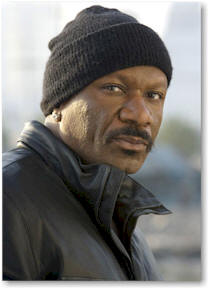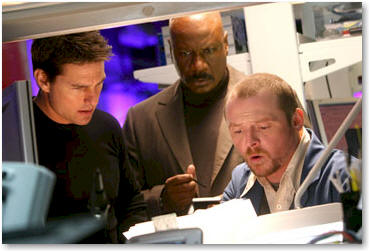
Ving Rhames: The Mission:
Impossible III Interview with
Kam Williams (KW)
Hailing from Harlem, Ving Rhames attended NYC's High School for the Performing Arts and the Julliard School of Drama before debuting on Broadway in The Winter Boys in 1984.
Since then, he's enjoyed a flourishing film career marked by appearances in such hit flicks as Pulp Fiction, Mission Impossible 1 & 2, Striptease, Rosewood, Entrapment, Baby Boy, Dark Blue, and Dawn of the Dead. Here, Ving shares his thoughts about Mission Impossible III, where he reprises his role as Tom Cruise's sidekick, Luther Stickell.
KW: How did they decide to enrich your role this go-round?
VR: I'll quote [director] J.J. Abrams. He said, ’Look, if you have Ving Rhames, use him.’ So, what you see in this one is that it's a little more ensemble-oriented. Of course, Tom is the lead, but we really make full use of the skills of the other members of the team. Tom and I have a very good natural chemistry, and you get to see more of that in this film. As a matter of fact, some of the conversations that we have in this one could be two friends at a bar. We have them in the middle of a dangerous situation. I think this is more true to how friends relate to one another.
KW: Do you feel that your own relationship with Tom has developed right along with your characters?
VR: Yes, of course I've known Tom now for ten years. We have a very good chemistry off-camera, and I think we were able to utilize that on-camera.
KW: Do you think that the addition of humor helped humanize your character?
VR: That, and also the fact that J.J.'s a former actor, a writer, and he's also younger than the previous two directors. So, I think his finger's a little closer to the pulse of mainstream America. So, he's just a little more in touch. This one's a little fresher, and I honestly think he's put things in it that will appeal even more to women, like the whole love story. And I'm saying love story, as opposed to a sex story.
 KW: How does it feel to
have appeared in all three installments of Mission Impossible?
KW: How does it feel to
have appeared in all three installments of Mission Impossible?
VR: The beauty of this one, for me, in coming back, is the script, J.J. Abrams and the other writers, the new cast members and the energy and authenticity that they bring to the piece, and the fact that we all had an extremely good chemistry with one another. So, it was a chance to have some fun and make a good deal of money.
KW: What was it like working with Tom as producer and with a new director in J.J.?
VR: What I love about Tom as an executive producer, and even with J.J., to me, we work as actors in what I call a structured freedom. We have freedom to do things and move within certain parameters. And I think part of that is because J.J. as an actor and Tom as an executive producer slash actor understand that sometimes actors do things as an action and reaction. Having that kind of freedom just adds a fluidity to the piece.
KW: How is this installment different from the first two?
VR: It's more similar to the television series. You have the Impossible Mission team, and the importance of each team member. Also, I also think that because Tom's character has a love interest, in those scenes where he's in danger, his family is in danger. If something happens to him, what happens to them? Adding those elements to all of the high-octane action puts this a level or two above Missions I and II.
KW: What was the most rewarding aspect of making this movie?
VR: The most rewarding part of this for me is you get to learn a bit more about the humanity of the characters in the interactions outside of their job. That's the part that I really enjoy about the film, especially with Ethan [Tom Cruise's character]. You really get to see him outside of work.
KW: How would you describe your character Luther's relationship with Ethan?
VR: we're comrades, but also outside of work there's a friendship and there's a bond, and I think you get to feel some of that flavor during this Mission.
KW: How do you expect the audience to respond to the camaraderie and character development?
VR: The audience will be able to relate to them more. What is it like, say, for a police officer, a fireman, or what have you, who puts their life on the line possibly every day, but then has to come home to deal with children, a wife, or what have you. So, for this one, the audience will have a stronger connection to the characters in that regard, because J.J. Abrams does a very good job of making these people human.
KW: Why is everybody I've spoken with so high on J.J.?
VR: He has a very good rapport with the actors. And he's a people person, and brings a very youthful energy to the set that's contagious to actors.
KW: Were you a fan of the original Mission Impossible TV-show?
VR: No, I never really watched the original series. I only watched re-runs of it when I first found out I was on Mission I.
Related Links
Mission Impossible Movie Review